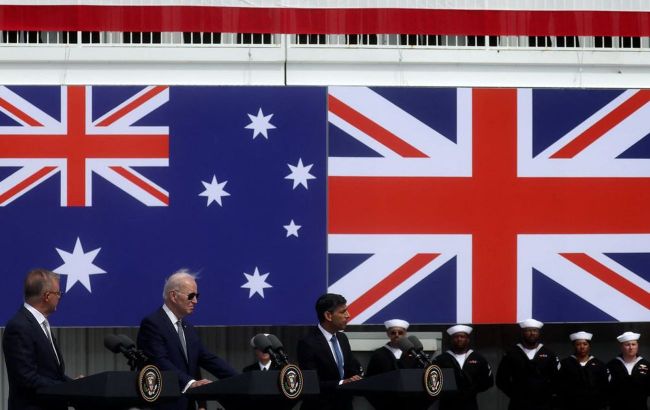US, UK, and Australia want to involve Japan in countering China's influence
 Planned start of negotiations on Japan's entry into the AUKUS pact (photo: twitter.com/ReutersWorld)
Planned start of negotiations on Japan's entry into the AUKUS pact (photo: twitter.com/ReutersWorld)
The US, the UK, and Australia intend to begin negotiations regarding the inclusion of new members in the AUKUS organization. Washington insists on involving Japan as a restraining factor against the growing influence of China in the Indo-Pacific region, according to the Financial Times.
The AUKUS defense pact, formed by three countries in 2021, is part of the efforts of these countries to counter China's growing influence in the Indo-Pacific region. Beijing has called the pact dangerous and warned that it could provoke a regional arms race.
According to sources familiar with the situation, on Monday, March 8, the defense ministers of AUKUS member countries will announce the start of negotiations related to the alliance's second component. It involves cooperation in underwater capabilities and hypersonic weapons. However, they are not considering the possibility of expanding the first component, which focuses on Australia's acquisition of nuclear-powered submarines.
This statement will be made on the eve of Japanese Prime Minister Fumio Kishida's visit to the White House for a historic trilateral meeting between the US, Japan, and the Philippines on Thursday, April 11. On Wednesday, the US and Japan will announce the largest update to their security alliance since 1960.
The Aukus pledge to begin consultations on expansion is a compromise between the allies after some US officials pushed for Japan to join Aukus formally as a member.
When Aukus was launched in 2021, there was talk about others joining Pillar II at some point. As the critical ally in Asia for each member, Japan was the natural candidate for what was dubbed Jaukus.
For example, Japan is increasing its defense spending, investing more in the development of hypersonic weapons. Involving other partners would also help distribute the costs of developing technologies, according to the Financial Times.
Speculation had mounted that Tokyo would be asked to work on Pillar II, particularly after US ambassador to Tokyo Rahm Emanuel this week said Japan was about to become the first additional Pillar II partner.
Some in the US government privately welcomed his intervention, hoping that it would add momentum to bringing Japan into Aukus. But his comments ruffled feathers from the White House to London, Canberra and Tokyo because there was no agreement.
The Financial Times notes that Australia and the UK have been reluctant for months to invite Japan, partly because they want to focus on resolving existing complications in trilateral cooperation.
US Deputy Secretary of State and advocate for Japan's participation in AUKUS Kurt Campbell stated last week that the US is separately working on development and joint production with both the UK and Australia, but how we will cooperate trilaterally over time is a complex task.
The UK and Australia are also concerned, as are many in Washington, that Japan still lacks the security systems required to protect highly sensitive information. Campbell appeared to concede that Tokyo had more work to do, saying the US had been urging it to take measures.
"Japan has taken some of those steps, but not all of them," Campbell said at an event on AUKUS at the CNAS think tank in Washington.
Canberra emphasizes the need to focus on the submarine program before expanding AUKUS by involving countries in the second component.
"All three still agree that getting Pillar I locked in is the priority," said a person familiar with the discussions among AUKUS allies.
The issue has sparked much debate between the allies and inside the US administration. At one point, there was an idea to have Biden, Australian Prime Minister Anthony Albanese and UK Prime Minister Rishi Sunak issue a joint statement to generate more impact. But they ultimately opted to have the defence ministers announce the move.
The Aukus statement will potentially pave the way for Biden and Kishida to include an aspirational reference about future Japanese involvement in the joint statement they will issue after their summit.
At the same time, debates are also ongoing in Japan. While Tokyo has been a strong supporter of AUKUS, some officials have been cautious and not overly insistent on Japan's inclusion, given the differences within the pact's member countries.
In an interview with the Financial Times and other media outlets on Friday, April 5, Kishida said that an official decision on how Japan will cooperate with AUKUS in the future has not yet been made.
"To achieve a free and open Indo-Pacific, we would like to continue various efforts to strengthen our co-operation with the US, Australia and the UK, who are important partners in security and defence," said the head of the Japanese government.
In March 2023, the Prime Ministers of Australia, Anthony Albanese, and Britain, Rishi Sunak, as well as President of the United States Joe Biden, announced the agreement of the states participating in the AUKUS alliance to provide the Australian Navy with nuclear-powered submarines.
Japanese media have reported that AUKUS countries are interested in using Japanese technologies, including for the development of hypersonic weapons and strengthening electronic warfare capabilities.
Meanwhile, the UK will increase its nuclear energy experts through the construction of new submarines for Britain, as well as for Australia under the AUKUS security pact.

